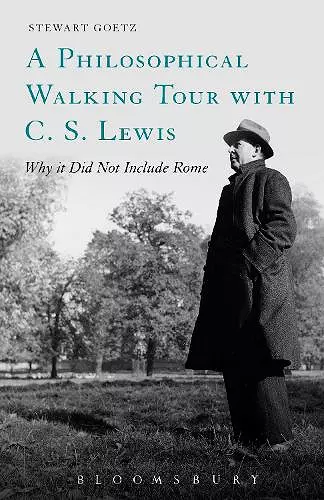A Philosophical Walking Tour with C. S. Lewis
Why it Did Not Include Rome
Professor Stewart Goetz author
Format:Hardback
Publisher:Bloomsbury Publishing PLC
Published:12th Feb '15
Currently unavailable, and unfortunately no date known when it will be back

Examines the neglected topic of C.S. Lewis’ views of pleasure, happiness, and the soul and why they are relevant to an explanation of his not becoming a Roman Catholic.
Although it has been almost seventy years since Time declared C.S. Lewis one of the world's most influential spokespersons for Christianity and fifty years since Lewis's death, his influence remains just as great if not greater today. While much has been written on Lewis and his work, virtually nothing has been written from a philosophical perspective on his views of happiness, pleasure, pain, and the soul and body. As a result, no one so far has recognized that his views on these matters are deeply interesting and controversial, and—perhaps more jarring—no one has yet adequately explained why Lewis never became a Roman Catholic. Stewart Goetz's careful investigation of Lewis's philosophical thought reveals oft-overlooked implications and demonstrates that it was, at its root, at odds with that of Thomas Aquinas and, thereby, the Roman Catholic Church.
A book all interested in C. S. Lewis will want to read. * Church of England Newspaper *
This [is a] philosophical page-turner ... One of the most unique and eclectic books on Lewis in recent years, it easily shoots to the top rank of studies on Lewis’s philosophical and theological thought ... Highly recommendable for serious philosophers and students in ‘Lewisiology’. * Theology *
Goetz makes a strong case that Lewis is a hedonist concerning happiness and that he is a substance dualist with regard to mind and body … this book fills a major gap in the literature on Lewis’s philosophical ideas. Summing Up: Recommended. Lower-level undergraduates through researchers/faculty. -- D. C. Kolb, St. Meinrad Archabbey Library * CHOICE *
Why didn’t C. S. Lewis’s religious journey end in Rome? Stewart Goetz suggests that the answer involves a theoretical quarrel with Thomas Aquinas about pleasure and the soul. It is a provocative thesis, carefully argued. * Christian Century (reviewed by Dennis O'Brien) *
This book is doubly intriguing, both as a fresh and illuminating piece of Lewis scholarship, and as an exploration of philosophical issues that are deeply interesting in their own right, such as the relationship between pleasure and true happiness. Goetz makes a convincing case that Lewis retained his Protestant identity not only for reasons typically cited, but also because of fundamental differences with Rome that were philosophical in nature. Anyone interested in these issues will find this volume fascinating as well as informative. * Jerry L. Walls, Scholar in Residence and Professor of Philosophy, Houston Baptist University, USA *
An informative argument to the effect that Lewis’s views of happiness (Hedonism) and the self (Substance Dualism) were the primary intellectual barriers to him becoming a Roman Catholic--anyone with an interest in Lewis as a philosopher/theologian will find much here that is both pleasurable and good for the soul. * T.J. Mawson, Fellow and Tutor in Philosophy, St. Peter’s College, University of Oxford, UK *
This is the most intellectually satisfying book on C. S. Lewis I have read. Because of Goetz's meticulous and respectful attention to Lewis's thought, as required for accurate treatment of his philosophical opinions, all that he says consequently about his subject bears the mark of this fair and careful reasoning. He is convincing on Lewis's differences with the received Catholic philosophy of his time; nothing in it is careless, facile, or partisan, and he blesses in particular Catholic readers who love Lewis with his conviction that inability to join the Catholic Church was based primarily on honorable difficulties with Thomism … [A] must-read book. * Touchstone (reviewed by S. M. Hutchens, senior editor of Touchstone) *
ISBN: 9781628923162
Dimensions: unknown
Weight: 386g
200 pages